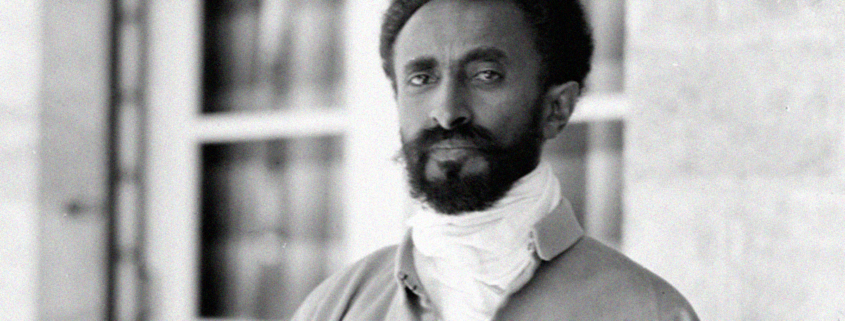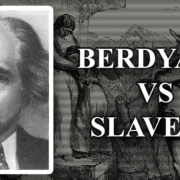The Serving Monarch
The role of the monarch in human history proves to be a fascinating subject. It is fascinating not only from the perspective of governance but also from that of religion and ethics. The anthropological trajectory of Ethiopia, according to its legend and history, is one example where this observation of ethical development can be made.
It is said in the Tarich-Negus chronicle that the first king of Ethiopia was a hybrid serpent-human named Arwe who ruled tyrannically through human sacrifice. Legend says that to appease Arwe, the reptilian king was fed a steady diet of milk and virgins.1 This ruthless king would be outwitted by a warrior named Angabo who fed Arwe a poisoned sheep. Angabo was then rewarded by the people with the throne of the Emperor.
This peculiar combination of monarchy, hybrid animal-human beings, and human sacrifice should not surprise anyone who has looked at the works of anthropologist René Girard. In fact, the Ethiopian chronicles give a far clearer indication of Girard’s work than any other ancient texts. Girard says that an understanding of monarchy is only possible on the basis of an understanding of sacrifice.2
Why did Arwe bear the semblance of a snake? In ancient societies, Girard claimed, the sacrificed person would often be remade into a non-human personality—an otherized creature.3 What could be the reason for Arwe’s insistence on sacrifice? We have reason to believe that, despite scanty evidence, human sacrifices were carried out during pre-Christian times4 and, also recently, in tribal parts of Ethiopia.5 What is most interesting, however, is the break from human sacrifice, that correlated with the ascent of Queen Makeda, otherwise known as the Queen of Sheba.
The interaction between the ancient Hebrews and the Ethiopians may have provided the foundation upon which the gradual but certain break from human sacrifice occurred. Skeptics will object here that human sacrifices were still carried out in Ethiopia as recently as the early 2010s, but that is overlooking the slow, human volition-dependent way the Biblical revelation seeps into culture and gradually overturns its sacrificial mechanism.
In ancient times, the monarch was judge, jury, and executioner, regardless of any morality that existed outside the crowd. Monarchs could sacrifice whoever and for whatever reasons; it is for this very reason that pagan monarchs were often worshiped as deities by the masses. This might-makes-right morality is reversed in the scriptures where the prophet Nathan boldly rebukes King David for coveting Bathsheba and killing his neighbor in the process (2 Sam. 12). King David, being subject to the divine rule of God, submitted to Nathan’s rebuke and accepted judgment.
In the New Testament, the world’s idea of a monarch is subverted even more with the advent of Jesus. The ultimate ruler of the cosmos, despite fulfilling the Old Testament prophecies, is born into the shantytown of Bethlehem. This King would then preach to everyone that “the greatest among you will be your servant” (Matt. 23:11). Jesus would exemplify the Serving Monarch, just before His death on the cross, by washing the feet of His disciples (Matt. 26).
In his letter to the Philippians, Paul encourages us to follow Christ and thus imitate the archetype of the Serving Monarch:
In your relationships with one another, have the same mindset as Christ Jesus:
Who, being in very nature God, did not consider equality with God something to be used to his own advantage; rather, he made himself nothing by taking the very nature of a servant, being made in human likeness. And being found in appearance as a man, he humbled himself by becoming obedient to death—even death on a cross!
(Philippians 2:5-8, NIV)
At the doorsteps of the Second World War, Emperor Haile Selassie, with the vengeful forces of Mussolini in sight, had two options: he could fight the Italians to the last man as his predecessors did, or he could take a far more humbling and diplomatic route. Haile Selassie, at the insistence of his advisors, chose the latter.
Emperor Selassie sailed to England where he would spend time in exile but not in defeat. He would continue to ask his people not to lose hope while he stepped up his appeal to the League of Nations which was failing miserably to see the Fascist threat that was about to engulf the whole of Europe.
At the League of Nations, Selassie boldly asked the great nations of Europe and America to help his people who were being exterminated by chemical weapons. The British elites had already snubbed him and the American mainstream media, as it is often the case, were duped by Mussolini’s propaganda and myth-spewing mistress Margherita Sarfatti. The New York Times ran multiple headlines like, “Il Duce insists the chief aim of Italian policy is peace”6 and “MUSSOLINI, HOPE OF YOUTH, ITALY’S ‘MAN OF TOMORROW’; HARD WORK HIS CREED.”7
The greater nations of the League were all but taken in by the grand mythologies that Mussolini had fed them. It is here that we can observe how the ancient mythologies take their course, grinding down a morality of might-makes-right. The more powerful nations could afford to let Ethiopia be the scapegoat for Mussolini so that the dictator may stop after he’d had his fill of blood.
The smaller nations, however, were alarmed by Emperor Selassie’s warnings. Ghana’s president was furious with the League.8 A Czech spectator at the assembly shot himself after crying out for the fate of small countries.9 This proved that the mythologizing in favor of Mussolini was not entirely successful, and this was due to Emperor Selassie’s realistic description of the horrors faced by his countrymen. It was also the Christian revelation of Calvary, something that had seeped into the nations through trade and interaction, which made it impossible for the myth of Mussolini to unanimously take hold. As a result, a large movement arose in America, particularly among the black community, in support of Emperor Selassie.
What defines the Serving Monarch? The existence of such a ruler could only be possible with the revolutionary idea that Jesus brought forward with His earthly life. Christ said to His disciples:
“You know that the rulers of the Gentiles lord it over them, and their high officials exercise authority over them. Not so with you. Instead, whoever wants to become great among you must be your servant…”
(Matthew 20:24-26, NIV)
This revelation instilled a sense of value into the lives of every human person and, as a result, gone was the notion that the subjects of an emperor could be stepped over and sacrificed for “the greater good” of the whole. This also meant that emperors, or rulers of any kind, now had a greater duty to their people. They must start serving their people.
Haile Selassie, being in the line of the first Christian monarchy in history, was the first to voluntarily initiate a constitution for his nation. He brokered peace and urged cooperation between many African nations. He also initiated a program of building and developing power supply, roads, schools, hospitals, the arts, and many other modern-day necessities. But the Emperor was too slow, according to western reporters, and Ethiopia still backward. The New York Times wrote: “It is absurd to pretend that Ethiopia is a civilized nation in any Western sense of the word.”10
The serpent-king of Ethiopian folklore would come back under a new guise. Emperor Selassie would succeed in driving out fascism from his country, thanks to the outbreak of the Second World War, but he would be dethroned and murdered by socialism. Fascism would not succeed in killing him because the world today is largely haunted by the cross of Calvary. The death of the innocent Christ had stirred the notion in the minds of men that it is no longer acceptable to step over or trod on the lesser of society.
Socialism on the other hand thrives on violent sacrifice while feigning concern for the “least of these.” Thanks to the influence of socialist uprisings in Europe, liberal newspapers in America, and military aid from the Soviet Union, the socialists were able to kill Emperor Selassie. The left sacrificed Selassie on the alter of utopia, but the socialist dream never came true as their ascent to power led to the ruination of Ethiopia, culminating in the horrible famine of the 1980s.
Again, what is the definition of the Serving Monarch? The Serving Monarch is the anthropological effect of God the Son lowering Himself to the level of the human person and then, as God-incarnate, serving other human persons—washing their feet and dying on the cross at the hands of violent people. The incarnation of the Son of God means that we cannot afford to shun our neighbors for the sake of the ideal. The leftist revolutionaries realized this but they failed to grasp its radical message of voluntary servitude and self-sacrifice.
But what implication does the Christian revelation have on societies at large? Haile Selassie’s sacrifice at the hands of the DERG was one that failed in propelling progress. Our sacrificial tendencies, fueled by the accusatory spirit of the serpent-king, urge us to demand more sacrifices as our modern-day sacrifices fail in repetition. But there are no real monarchs in today’s world. Christ says we are all monarchs in His kingdom. “You are gods,” Jesus says (John 10:34) while instilling in us that we are His image-bearers and, therefore, treasured.
The key to escaping man-made sorrow and sacrificial violence lies in this revelation. The accusatory spirit of satan tries to reverse this to mean that we are all worthy to be sacrificed on the altar of progressive ideologies, but satan is trapped in a vicious circle as Christ reveals the truth about violence despite its many disguises. This is why Christ says that satan already stands condemned before us all (John 16:11).
- Dr. Sergew Hable Selassie, Ancient and Medieval Ethiopian History
- Girard, The Violence and the Sacred
- Girard, Things Hidden Since the Foundation of the World
- https://journals.sub.uni-hamburg.de/aethiopica/article/view/737/823
- https://www.christianitytoday.com/ct/2011/august/ethiopiariverdeath.html
- Dean W. Arnold, Unknown Empire: The Story of Mysterious Ethiopia and the Future Ark of Civilization
- https://www.nytimes.com/1922/11/05/archives/mussolini-hope-of-youth-italys-man-of-tomorrow-hard-work-his-creed.html
- Dean W. Arnold, Unknown Empire: The Story of Mysterious Ethiopia and the Future Ark of Civilization
- Anthony Eden, Facing the Dictators: The Eden Memoirs
- Dean W. Arnold, Unknown Empire: The Story of Mysterious Ethiopia and the Future Ark of Civilization










Leave a Reply
Want to join the discussion?Feel free to contribute!